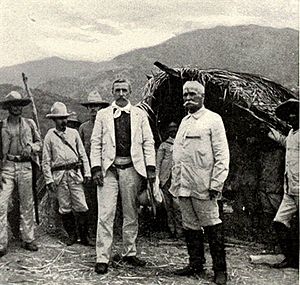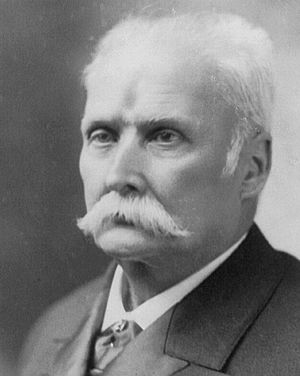Calixto García facts for kids
Calixto García Íñiguez (born August 4, 1839 – died December 11, 1898) was an important Cuban general. He fought in three major Cuban uprisings. These wars were part of Cuba's fight for independence from Spain. They included the Ten Years' War, the Little War, and the War of 1895. This last war led to the Spanish–American War and finally, to Cuba becoming an independent nation.
Contents
Who Was Calixto García?
Calixto García was born in Holguín, Cuba. His parents were Cuban Criollo people. He grew up to be a strong and educated man. He was known for being determined and sometimes quick to anger.
Calixto García's Family History
Calixto García's grandfather, Calixto García de Luna e Izquierdo, was also a fighter. He fought in the Venezuelan War of Independence in 1821. His grandfather was even jailed for fighting for freedom and rights for all people. Calixto García had a wife, Isabel Velez Cabrera, and many children. Several of his sons, like Carlos García Velez, later fought alongside him in the wars.
Calixto García's Fight for Freedom
Calixto García started fighting for Cuba's independence when he was about 18 years old. This was the start of the Ten Years' War.
Early Battles and Capture
García fought against Spanish rule for five years. He was a brave leader. During one battle, he was almost captured by the Spanish. To avoid being taken prisoner, he tried to take his own life. He survived, but the wound left a large scar and caused him headaches for the rest of his life. After this, he was imprisoned by the Spanish.
Release and Return to War
Calixto García was held prisoner until the Pact of Zanjón was signed in 1878. This agreement ended the Ten Years' War. After his release, García traveled to Paris and New York. But he never gave up his dream of a free Cuba.
He soon joined Antonio Maceo Grajales in the Little War (1879-1880). He also fought in the 1895 War for Independence. In this last war, he became the second-in-command of the Cuban Army, serving under Maceo. He and some of his sons managed to escape from Spain and returned to Cuba with supplies in 1896.
Victories and Support for U.S. Troops

General García won many battles during the war. He captured important towns like Tunas and Guisa. He also took back Bayamo, which was a very meaningful victory for the Cuban people. García was very smart and used spies to plan his attacks. Many important figures fought with him, including future Cuban president Mario García Menocal.
When U.S. troops arrived in Cuba, García's forces helped them. He controlled the area around Santiago and prepared landing spots for the U.S. Army. His soldiers also supported the U.S. Marines at Guantanamo. García worked closely with the American troops in military actions. However, he was sadly not allowed to enter Santiago de Cuba when the Spanish surrendered, which was a great disappointment to him.
Calixto García's Final Years
Calixto García died on December 11, 1898, in Washington, D.C. He was 59 years old and died from pneumonia. He was in Washington on an important diplomatic mission.
Burial and Memorials
He was first buried temporarily in Arlington National Cemetery in the U.S. Later, his body was brought back to Cuba on a warship. His final burial in Cuba was a very emotional event. Today, you can find statues and busts of him all over Cuba. A large statue stands on the Malecón in Havana.
Calixto García's Legacy
Calixto García's bravery inspired many. The famous essay "A Message to Garcia" by Elbert Hubbard was written about him. It tells the story of U.S. officer Andrew Rowan's difficult mission to contact García during the Spanish-American War. For many years, "to take a message to García" was a popular saying in the U.S. It meant taking on a very tough challenge.
His story was even made into two American films: a silent movie in 1916 and another film in 1936. In 1976, a town in Holguín Province was named Calixto García in his honor. His picture is also on the 50 Cuban peso banknote, showing his importance to Cuba.
Images for kids
See also
 In Spanish: Calixto García para niños
In Spanish: Calixto García para niños
 | Precious Adams |
 | Lauren Anderson |
 | Janet Collins |



